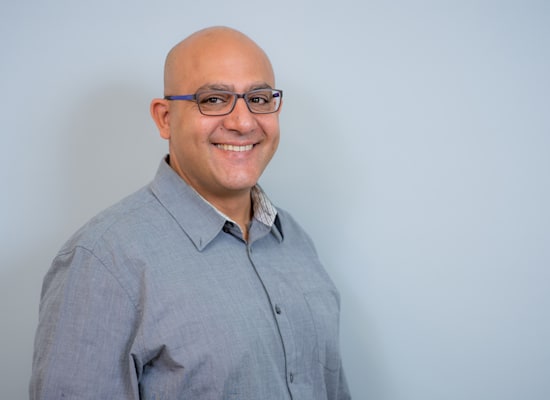Introducing Prof. Doron Nave

Prof. Doron Naveh specializes in the development of two-dimensional materials and their application in electronic devices. The graphene developed in his lab could help achieve significant reduction of global energy consumption.
As computers play an increasingly growing role in our lives, more and more servers are needed. Mega-firms like Google, Amazon, and Facebook are investing in enormous server farms, while their energy consumption beggars belief. "One percent of the overall global energy consumption has been invested in server farms in recent years," says Prof. Doron Naveh. "Giant companies use centers whose power consumption equals that of a country the size of England, and about a third of this energy is used for cooling the data center, as it generates a lot of heat. Therefore, developing solutions to help these farms consume less energy and reuse it is a very important task, economically as well as environmentally."
Prof. Naveh was one of the scientists who contributed to finding a solution to this problem. In a project carried out in his lab in collaboration with Nvidia and under the Israel Innovation Authority, a new graphene technology was developed. "Graphene is the best conductor of electricity and heat that known to us. This material is single carbon atom thick, transparent to light, and very strong, way stronger than steel," he explains. "As part of the project, a certain type of graphene was synthetically developed in our lab, its layers rotating at one angle towards the other. This angle creates a cyclical structure with a cycle length that’s significantly larger than the natural cycle of the material, which causes the quantum properties of the particles moving in the graphene to change, making their momentum very limited, while their speed decreases. In other words, we developed a material whose thermal conductivity is the highest in the world today, complete with the technology to produce it to meet the industry’s needs. Nvidia has already announced that it’s adopting the technology and is set to promote development that will enable its successful integration. At the same time, we are in the process of setting up a company to produce the required graphene, in collaboration with Bar-Ilan, Tel Aviv University, and Simtal Nano-Coatings Ltd., a company led by my former students, who earned their doctorate in the field."
Prof. Naveh, a married father of two, earned his bachelor's degree in physics and materials engineering, and a second degree in physics from Ben-Gurion University. He then went on complete his computational materials science PhD at the Weizmann Institute. He did his postdoctoral work in theoretical computational materials science at Princeton, and later at Carnegie Mellon University, where he switched to electronics engineering and specialized in electronic devices as experimental science. He joined Bar-Ilan’s Faculty of Engineering in 2012 and later served as head of the nanoelectronics track. "Basically, I’m both a theorist and an experimentalist, and to this day I do experiments, theory, and calculations. I specialize in 2D materials, single-atom or a few atoms thick, while in my lab, we develop these materials and use them to build electronic devices," he explains. "This is also why I really enjoy my work: I have the opportunity to focus on many topics that I love and that matter to me. Inventing and building systems, on the one hand, and materials science on the other. In other words, I can find new physical effects by calculation, then use those effects in the applications of electronic devices. I master all these different worlds, which is diverse and interesting."
The systems Prof. Naveh has been constructing are primarily optoelectronic devices, such as sensors, while in recent years he has been integrating them into AI systems, in close collaboration with industry. Accordingly, UnBox Ventures, Bar-Ilan’s entrepreneurship platform, is now starting a firm to develop a tiny sensor for measuring the spectrum of light, developed in Prof. Naveh's lab. "The technology is based on tiny sensors that replace large measuring devices using a small chip and AI," he says. "This miniaturization makes it possible to incorporate smart sensors into mobile devices, such as smartphones and smartwatches, and to measure a spectrum of things: from physiological measurements such as changes in blood composition and glucose, alcohol and oxygen levels, to external things, such as the water we drink."
In recent months, Prof. Naveh has been working on another project: establishing a materials engineering curriculum, to be launched at Bar-Ilan’s Faculty of Engineering in the 2023-24 academic year. "We have built a unique curriculum that with a choice of four areas of knowledge, complete with a range of topics materials-associated topics: computational materials science, which uses computer programs, data, and AI to invent new materials or new applications for existing materials; materials chemistry, which is closer to classical materials science; materials and electronic devices, highly relevant for the chip industry, for example; and sustainability and environmental materials, which has to do with the production, storage, and transportation of energy, with emphasis on green energy, new products environment-minded design," specifies Prof. Naveh. "Some of my former students are now working in data science at Intel, on the sensors with Apple or in applied materials, while some have opened their own startups, associated with graphene or in areas such as sensors. Graduates of the program can be employed by the industry, in hi-tech, or by the security industry and aerospace industries, in more traditional industries, or in sustainability-related industries, and they are in high demand."
Click here to read more about the materials engineering program
Last Updated Date : 24/08/2023



